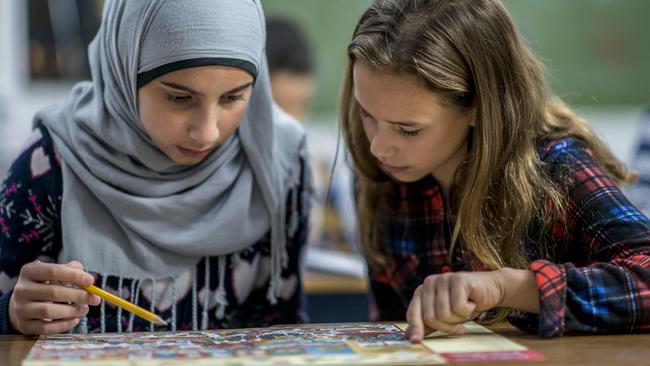Value in migrant students’ life skills
Western schooling discriminates against Indigenous and migrant students, a two-year study has concluded.

Western schooling discriminates against Indigenous and migrant students, who should have their life skills formally assessed and recognised, a two-year study has concluded.
The Centre for Social Impact (CSI) at the University of NSW has demanded sweeping changes to the education system to embrace disadvantaged students so they can find rewarding jobs.
In a new Education Equity report, it calls for “social skills and life experience’’ to be formally recognised as a part of students’ educational achievements.
It suggests migrant students be given formal recognition of skills such as foreign languages, translating or caring for family members.
“There is much to do to counteract Western understandings of ‘knowledge’ that significantly disadvantage those from non-Western backgrounds,’’ it states. “Skills and competencies acquired outside education settings need to be properly recognised against defined standards.’’
Lead researcher Meera Varadharajan said many students from disadvantaged backgrounds, including poverty and disability, boasted life skills that were valuable to employers.
“Students from disadvantaged backgrounds have a rich array of skills and competencies … acquired outside of school but it’s not captured or channelled through traditional pathways,’’ she said. “Don’t just look at academic skills, but problem-solving skills, empathy, confidence and self-esteem, resilience and independence.
“If students are really fluent in their (home) language, are they using this to tutor younger children, or to translate for migrants in aged care? If these skills are not recognised and documented, employers won’t even know they exist, so it’s a big loss to society and the economy.
“We want to make sure their skills and competencies are adequately documented and assessed so they don’t miss out on getting credentials and securing employment.’’
The report criticises standardised testing – including the National Assessment Program – Literacy and Numeracy (NAPLAN) – as “discriminatory towards certain group (sic) of students, leading to ‘lower performance’ as measured against Western concepts of success’’.
It says “Western’’ testing fails to “capture and record all academic and non-academic (eg, social) dimensions of learning’’.
The report calls for higher school attendance, along with better literacy and numeracy skills, for Aboriginal and Torres Strait Islander students.
But it also wants to “prioritise and embed Aboriginal perspectives and values in school and classroom curriculum’’.
It calls for changes to the national curriculum “so all students are balanced in both worlds, strong in both their Western knowledge and English and their Indigenous identity, cultural knowledge and language’’.
The CSI study, which assessed existing educational programs over the past two years, criticises the “Western-informed ‘mainstream’ understandings that stigmatise and stereotype students from certain demographic groups’’.
The report suggests skills gained from volunteering, part-time work or caring for family members be formally recognised in learning modules within the Australian curriculum.




To join the conversation, please log in. Don't have an account? Register
Join the conversation, you are commenting as Logout